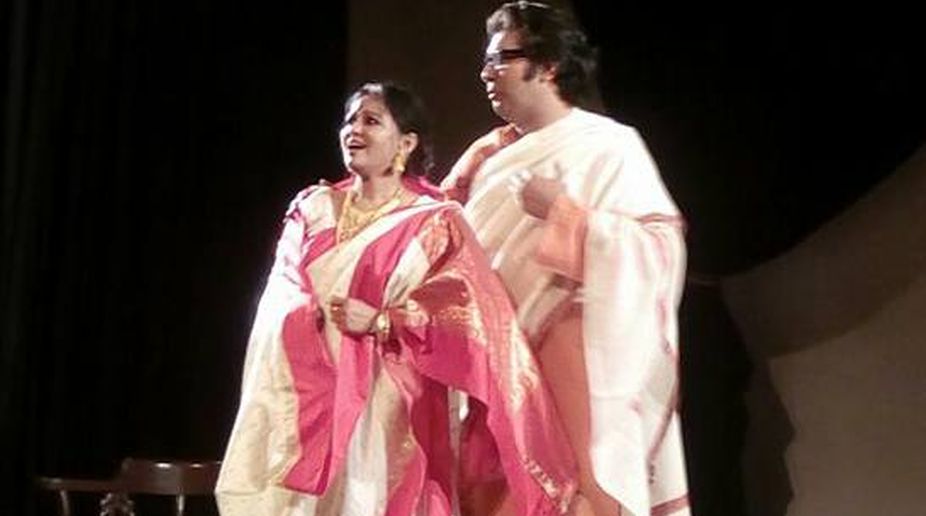A beautiful tale of romance, companionship, deceit, and freedom came alive when excerpts from the most controversial and socially-relevant novel by Rabindranath Tagore, Ghare-Baire, written in 1916, were staged at a drama festival in the national capital last week.
Set against the backdrop of Swadeshi movement after Lord Curzon’s partition of Bengal, the play was staged by Navapalli Natya Sanstha (NNS) at drama festival organised by Bengal association to celebrate World Theatre Day on 8 April at Muktadhara Hall, New Delhi. The festival succeeded in bringing together 22 theatre groups of Delhi-NCR.
The festival depicted traditional richness of Bengals literature, art and culture came to the fore in a very brief time slot of 20 minutes for each of the 22 plays. The festival was dedicated to renowned director and theatre artiste Subimal Bandhopadhya, whose 100th birth anniversary celebrated this year.
Each production was invariably extremely neat, clearly articulated, and combine drama with body movement to highlight abstract ideas of the inner meaning of the story enacted.
A variety of significant topics, such as womens issues, the lives of the middle class, old-age persons, life of theatre artists and different social relationship, to name a few, were portrayed. The plays dabbled in diverse genres, such as satire, musicals, comedy, thriller suspense and romance.
Stealing the show were the well-groomed child actors, who enacted the play “Je Jokhon Se Thokhon” with unimaginable talent and unlimited fun. A production of “Natyarango”, the play was based on a hypothecated comic story.
Commenting on the festival, Biswajit Sinha of NNS, a renowned Bengali dramatist, and theatre director said, " Each of our dramatic pieces reveals the social orientation and generates interest among the new generation about Bengal’s fertile socio-cultural past depicting the prevailing situation from 18th to 20th century. Rabishankar Kar, chairman of the festival, a well-known Delhi theatre actor, and director, who has been trying to reinvent the stage as an art space since 1998, told The Statesman that World Theatre Day is an opportunity for play-writers, directors, and artists to think beyond conventional theatre, do something different and experiment. It is very important to encourage and motivate young artists and we at “Aamra Kajon” are working on this very seriously. It has been an interesting experience for the faculty and students alike as we groom youngsters at a three-month theatre workshop annually. ‘Aamra Kajon’ young artistes staged a non-verbal micro play, “My Family”. Kar also spoke of the difficulties and challenges in organising such an event.
Theatre groups outside Bengal, especially in Delhi, are doing very well with their limited resources but the tragedy is that they are not getting the recognition they deserve he added.
The concept of micro-drama fest was novel, though it conformed to the modern trends as manifested in T20 cricket, full of entertaining giving a morale boost and confidence to India’s theatre fraternity. “A lot of opportunities have been created to learn from each other and to compare ourselves with other theatre groups. There is a strong need to get back the position we have lost in the cultural arena,” said Debabrata Sarkar, a theatre artist.
Advertisement











